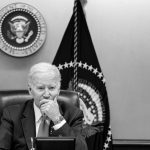The chatter surrounding President Trump’s latest “plan” for Gaza has kicked off another round of melodrama from mainstream media. Despite the sensational headlines, the truth is simpler: Trump is not about to “take over” Gaza, nor is the U.S. set to own it. Anyone with even a modest grasp of Trump’s history knows that his grandiose proclamations are often just that—grandiosity aimed at grabbing attention rather than serious foreign policy. What’s often lost in all the bluster, however, is the reality that far more Palestinians have been lost to the hands of groups like Hamas than at the hands of any outside force.
NBC’s latest segment featuring chief foreign correspondent Richard Engel quickly devolved into a theater of the absurd where facts took a backseat to emotion. Engel, a self-admitted expert on the region, wasted no time elaborating on the supposed shock and horror among Middle Eastern leaders at Trump’s announcement. Apparently, it’s not feasible to suggest that the U.S. could help restore some order in Gaza, a place plagued by destabilizing forces for decades. Engel’s dramatics seem to ignore the true devastation wrought by Hamas on its own people.
This is how @BBCNews is currently choosing to cover Trump’s plan to kick Palestinians out of #Gaza: as resettled, not purged, expelled, ethnically cleansed. Not even in quote marks. They blithely go on about how language matters and then use the words of the occupiers… pic.twitter.com/8xlgQW5YDH
— Des Freedman (@lazebnic) February 5, 2025
It seems absurd to gloss over the fact that it is Islamist factions who have long sought to push out not only their neighbors but also their own people who dare to oppose them. Engel’s concern about many Palestinians “not wanting to go” is touching but conveniently disregards the grim reality that many of those same Palestinians face the constant threat of violence from Hamas and its ilk. The very same individuals Engel purports to defend are often caught in a cycle of fear and sorrow due to terrorism.
The narrative presented by Engel concerning the refusal of neighboring countries to accept any of these so-called refugees is comical and hypocritical. Would he prefer that these neighboring states—rich with resources and power—continue to turn a blind eye while these individuals suffer? His conjecture suggesting that U.S. forces would engage in some type of forced relocation reads more like the script of a poorly written dystopian film. The circumstances in Gaza were set into motion long before Trump’s appearance on the scene, thanks in large part to the hostile agendas of terrorist organizations.
Engel justifies his dismissal of Trump’s vision for Gaza—transforming it into a “Riviera of the Middle East”—by questioning for whom this paradise would be built. It’s a presumption drenched in bias; the insinuation that any development would only benefit Israelis conveniently forgets the considerable amount of tragedy that has unfolded due to the factions that have the most to gain from chaos: Hamas and similar groups. The notion that Trump might seek to invest in infrastructure or economic growth is met with skepticism, revealing Engel’s own biases more than any objective analysis.
At the root of Engel’s reluctance to entertain a constructive plan is a fear of the law of unintended consequences. This is a concept conservatives understand all too well, especially when it comes to U.S. military involvement in foreign conflicts. If the United States were to step into Gaza, it’s not hard to imagine how quickly things could spiral out of control, leading to an entanglement in a “gorilla” war—exactly the kind of foreign involvement that many were hoping Trump would steer clear of during his presidency.
In a world that craves clarity, the media’s penchant for sensationalism has obscured the reality on the ground. Instead of addressing the rampant instability perpetuated by radical factions, the focus remains fixated on Trump’s provocative statements. Perhaps, in the end, it is not Trump’s vision that raises eyebrows but the unwillingness of analysts like Engel to tackle the less palatable truth about the complexities fueled by Hamas and its continuous reign of terror. The more things change, the more they stay the same, especially in the playground of geopolitical conflicts.




